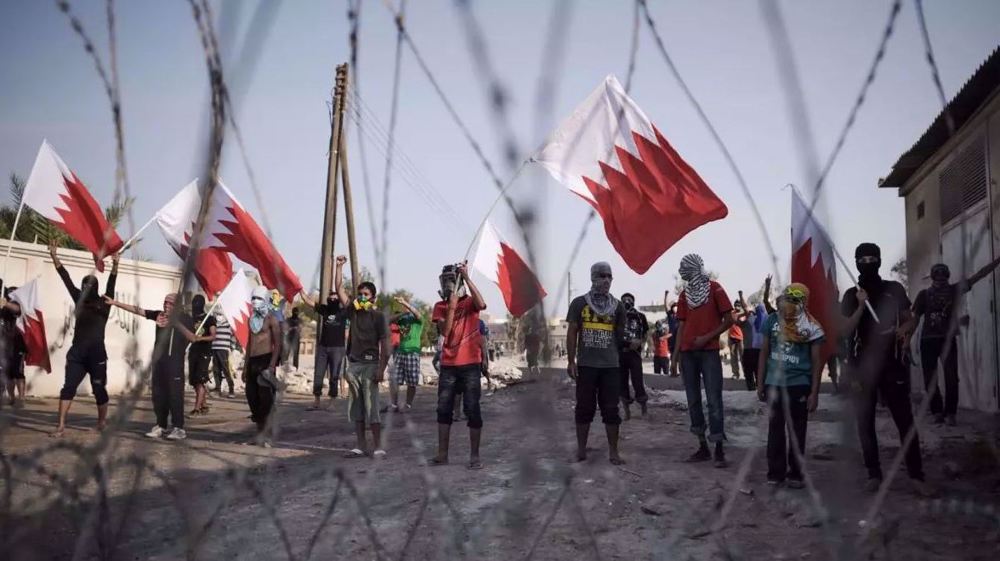AhlulBayt News Agency (ABNA): Bahraini political prisoners locked up at the Jau jail, the largest correctional facility for men in the tiny Persian Gulf island where freedom of expression is severely limited, have reported being subjected to harsher “psychological torture” this summer.
London-based Middle East Eye (MEE) cited an audio recording from an inmate held in Jau, calling on the international community to help the prisoners by mounting pressure on Manama to ease the inhumane conditions the inmates are presently kept in at the facility.
The inmate revealed that Bahraini prison officials had put restrictions on the inmates’ access to water and food, prohibiting prisoners from taking certain meals in the day and preventing them from drinking tea.
“Our situation is really bad now. Since yesterday morning, they cut off the electricity and all the means of life,” revealed the tortured detainee, whose name is being withheld for fever of reprisal by Bahraini prison officials, in the audio message dating July 17, 2024. “The air conditioning is gone. We are now sitting in the heat and darkness. We even don’t have cold water.”
Meanwhile, United Nations experts aware of the prisoners’ plight have called on Bahrain’s officials to immediately address the situation and alleviate the human rights violations reported at Jau.
Alice Jill Edwards, the UN special rapporteur on torture, Michael Fakhri, the special rapporteur on the right to food, and Tlaleng Mofokeng, special rapporteur on living standards and mental health, co-signed a statement published on Thursday urging Manama to address to issues at the Jau prison, which is frequently used by Bahraini official to detain political prisoners opposed to the Saudi-backed monarchy ruling in Bahrain.
The three UN experts called for rapid action from Manama to ease the harsh confections and prevent the inmates suffering and “psychological torture” at Jau during the extremely hot summer time in the Persian Gulf island-state.
“We have received worrying allegations that since March 2024, in response to protests by prisoners for better conditions, detainees held in some buildings of the prison are often being denied required medical care and do not have regular access to adequate food and safe drinking water,” they wrote.
“Particularly worrying are allegations that authorities have cut air conditioning, exposing prisoners to extreme heat, with temperatures [rising] to 50°C,” the UN experts said.
Since then, MEE reported that air conditioning at the prison had been restored, but the lights were still out and prisoners were kept in cells that were dark.
UN experts believe the conditions at the facility could severely impact their mental and physical health, and even prove fatal to the inmates' health.
Earlier this year, inmates in prison began mass protests in March, urging prison officials to ease the harsh prison conditions they were kept in.
However, prison officials responded by enforcing even harsher conditions on the inmates, prompting the prisoners in five of the buildings at the Jau prison compound to hold more protests and demanding better conditions at the prison after one of the political prisoner, Husain Khalil Ibrahim, died on March 25 due to unbearable conditions.
Then, the Bahraini prison officials responded with harsher measures, including cutting electricity, drinking water, and reducing prisoners’ meals.
The Bahraini authorities' disregard for prisoners’ rights coupled with prison officials' heavy-handed crackdown on the helpless inmates locked up in jail has raised serious concerns among human rights advocates.
“Over 500 political prisoners are demanding their release and the improvement of their conditions,” said Ali al-Hajee, a human rights defender and former political prisoner at Jau. “There are concerns that force may be used to disperse the strike.”
The Bahraini authorities and prison officials are “punishing us and putting pressure on us and humiliating us, meaning we back down from all our demands,” the unnamed detainee said in the audio recording.
“They came to torture us psychologically and to exhaust us with all the means available to them, and no one is holding them accountable.”
The Bahraini embassy in London refrained from responding when it was contacted by MEE to comment on the matter.
“The Bahraini authorities are distorting reality, masking ongoing abuses of prisoners’ basic rights, said Sayed Ahmed Alwadaei from the Bahrain Institute for Rights and Democracy. ”This must come to an end. Political prisoners should be freed, and their rights should be restored without reprisals.”
The Al Khalifa dynasty, which was installed to power by the British government about half a century ago, has used an iron fist to repress any political opposition and retain absolute power in Bahrain. The current ruler, King Hamad bin Isa Al Khalifa, has overseen the repression, jailing and torturing of the opposition, while banishing political activists.
....................
End/ 257

